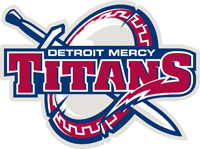Brand History
In 2016, University of Detroit Mercy implemented a new brand identity with a new logo and brand line to help position itself for a robust future.
The new brand was announced Thursday, Sept. 15, 2016 at the Celebrate Spirit! event attended by the University community. View the Brand video shown at the event.
Research Study & Findings
The branding process began in fall 2015 when the University undertook an extensive brand research study that included surveys, interviews and focus group sessions with alumni and donors, prospective undergraduate students and current students, faculty and staff, and community leaders and employers.
Research questions focused on the University's reputation, its name and location, its Catholic identity and alumni engagement.
The research findings clearly showed that our stakeholders recognize University of Detroit Mercy for its academic excellence and reputation. Other positive attributes included the University's service to the community, students' access to real-world experience, its small class sizes and personal approach, and its Catholic identity. Concerns, however, were raised related to its location and safety as well as cost.
The University also learned that most stakeholders have a positive perception about its name. Many believe the name best represents the history and identity of the institution, especially its connection to Detroit. However, the many different ways stakeholders refer to the University presents an identity issue.
Outcomes
As a result of this research, the University remains even more committed to its name: University of Detroit Mercy. But on second reference, and as shorthand, the University will begin to refer to itself as Detroit Mercy instead of using acronyms that may not be easily recognized or accurately reflect its name. Detroit Mercy reflects pride in its city and its values, emphasizing its strong connection to Detroit and the city's revitalization.
In addition, the University will have a new logo with a more collegiate look that links to its long history.
To reflect the educational experience the University offers students and its role in the city's revitalization, the University will implement a more aspirational brandline: Build A Boundless Future. This phrase reflects the hopes and goals of our students and the important difference a Detroit Mercy education can make in helping them reach their goals.
Promoting the brand

Check out Detroit Mercy's new brand in two new TV commercials, "Are You Ready" and "A New Era," which are airing on cable TV channels.
The new identity will be prominent on new banners and fence scrims around the McNichols Campus and on billboards around metro Detroit. New recruitment materials will also convey the new brand identity. See a preview of various marketing materials.
To order Detroit Mercy swag, visit the Bookstore website. Download the new logo, digital letterhead and more here!
Breaking down the new logo
The logo, inspired by the popular old English D used for a time by University of Detroit, immediately brings to mind a university. Its combination of the "D" in red and the "M" in blue, honors the traditions of both founding schools, while at the same time becoming something greater than its parts.

Our athletics teams will be
known as Detroit Mercy Titans.
Instead of acronyms, the University will be referred to as "Detroit Mercy" on second reference. It's short, specific and memorable. It accentuates the ties between the University and the city and honors the consolidation between University of Detroit and Mercy College of Detroit. The law and dental schools will be referred to as Detroit Mercy Law and Detroit Mercy Dental, respectively.
The aspirational brandline is simple yet strong and easy to remember. The word "build" ties the University to Detroit's legacy as a city that builds things and hints at Detroit Mercy's important role in helping revitalize Detroit. Most importantly, it speaks to the hopes of current and future students, and points out the role of faculty and administration in giving students the tools they need to build a boundless future for themselves and the city of Detroit.
